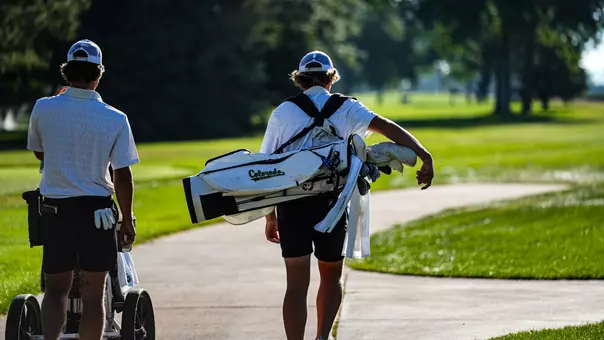Colorado State University Athletics

Rams Find Success the Heart of the Matter
5/12/2025 10:00:00 AM | Men's Golf
Staying regulated at regionals will help the cause
Keep it steady. For three consecutive days.
Beat by beat. Hole by hole – 54 in all. Let it pump in a steady rhythm. The Gold Mountain Golf Club will cover 6,505 or so yards. There is a high likelihood of rain on Monday, a bit of a chance the following two days. Keep the flow going at the similar rate, good or bad.
Because the Colorado State men's golf team knows it will encounter both, even the in between, as play begins Monday in the NCAA Regional round in Bremerton, Wash. A lot will happen over the three days as the Rams attempt to qualify for the NCAA Championships for the first time since doing so in 2023, but there's one thing each player hopes to keep consistent.
Their heart rate.
"I think it's something you get better over time with," junior Matthew Wilkinson said. "I look back probably to when I started playing golf, and I'd get on the first tee and I'd be, 'oh my God, what am I going to do now?' I think I've gotten a lot better at controlling it. Something that really helps me is I get up there, I take some deep breaths and it kind of gets me into it.
"I think it's something everyone deals with, especially the first hole of the tournament. There's nervous excitement up there, so I'm always trying to use it to my advantage."
If there was a magic formula, CSU first-year coach Jack Kennedy would be a rather wealthy man. There is no simple remedy, one-size-fits-all fix. It comes down to trial and error, finding the comfort zone for each player. It's something deep down they have to find for themselves.
Experience and maturity helps, and he can at least give his players some repetition in those areas.
"When we're out there, we're trying to increase their heart rate so we can see how they can perform under those conditions. Literally, sometimes before putting drills, we have them sprint in place for 10-15 seconds to elevate the heart rate. At practices, there are some nice bonuses or bad consequences on the line. We're trying to manipulate the brain and the mind that way.
"The game of golf, you get one shot at greatness. At practice what we try to do is really harp on the quality of the golf shot. Not as many reps, but do they really mean something. I look at guys' reactions at practice. When you hit a bad shot in a tournament, it's like the world has ended. The head is dropped, slamming their leg or something. In practice, it doesn't bother them. If it doesn't bother you in practice, it shouldn't bother you on the course. All those different things are to try to get them to understand every rep and every shot is important, and every reaction is equally important."
Some of the players wear a WHOOP device, which links to an app which will track their heart rate through a day, especially during a round. Some wear mood rings – seriously, they still exist – which can show a player where they are at in a particular moment.
Kennedy can see go back to an app, pick a specific time and relate it to a hole on the course and know where the player was in that particular moment. And it's not just when things are going bad, but also when they hit an amazing shot. The results are eerily similar – a spike.
He will tell you the numbers. When players in college ace a hole, more often than not it is followed by a bogey. They're too busy riding the wave. What he tracks is what he calls their rebound holes, and the success the Rams have had this year when posting a bogey or worse are encouraging.
"The reason why we are successful is we don't get into these funks and let it bother us for long. You see it in the last tournament," he said. "First round, we're plus-2, second to last, and a lot of teams could throw it in the towel, but the guys had the same resolve. They know its golf and their talent level is in there.
"It was my fault. I said winning was all we cared about. We knew we were getting into regionals, and that might have been a coaching error on my part. The bounce back as a team in the second round was phenomenal, and that's happened all year for us."
In a season, he's been able to learn his team a bit. With Christoph Bleier, the 2023 NCAA Regional individual champion at Auburn, his heart rate is steady as it comes, no matter what he shoots. A senior's gift, one might call it. Kennedy knows Wilkinson gets a bit juiced before a round. Jay Pabin is pretty steady. They all have a plan and stick to it. Each is different.
"Jake has no plan, by the way," referring to sophomore Jake Rodgers. "Who knows what's going on in Jakes head. It's fantastic. It's actually a really good quality."
He's been that way for two years for two different coaches. He finds it a bit funny that's the read from those around him, and he completely understands it, knowing full well that even if they don't see a code to crack with him, the game is tremendously important to him.
Besides, he has a surprise for them all.
"Actually, I just made this plan for myself. I'll pull it up," he starts right before the final practice session in Fort Collins. "My focus for this tournament is really mental because I found if my mental is really good, I usually play well. Attitude, self-talk, emotion, patience, acceptance, preparation, commitment, focus. Those are things that go into keeping the heartbeat regulated.
"Attitude, just keeping mellow. You can react to shots, but nothing major. Self-talk, try to always be positive. Emotion, calm. Patience, you always want to be patient on the course; birdies will come.
Acceptance, you want to accept the shot before you even hit it. If you hit a bad shot and you haven't accepted the outcome before you hit it, your mind can wander. Prep, you've got to prepare for the shot pretty much the same for every shot; circumstances vary. And you have to be committed and focused."
Yes, he has a plan, and it took awhile to get there from a kid who used to change his swing weekly growing up depending on who on the tour caught his fancy. For the past year, he's found a swing which has worked and stuck with it.
As for keeping steady in a round, that's been a mix of trying different things, taking in the opinion's and processes from those he trusts.
He trusts himself.
"I can see where they come from. When I'm on the course, my prep before a shot is a few things," he said. "I'm not looking over everything. I don't want to think too much or else I overthink. I go off feel. I barely use yardage books.
"I don't use books for putting at all. When I'm playing well, I'm playing. When I'm playing bad, I've got to grind. A book is not going to help. I just have to commit and follow my steps."
It's really not that different of a process than what has led Wilkinson to where he is at this point in his career. He appreciates the drills Kennedy has developed to amp up the pressure, should they come while working on specific aspects of the game or during rounds of play in practice. Even when they are not playing qualifying rounds against each other, something is on the line.
It's all helped. And what Wilkinson has found works best for him is taking a couple of slow, deep breaths over each shot.
"When you're playing really well, you don't have to think about it much because you hit a lot of good shots and you think, this is nice," he said. "The rounds where you don't have your best stuff and you're grinding out there, it's important to know where you're at and not get too low or too high on yourself. You have to sit there and say I need to find a nice middle ground today and post a good score.
"You talk to other players or coaches and ask, what have you done in these certain areas. You get a group of things, and you try them out, a little trial and error with them. I think it's a good thing to use the people around you to figure it out and find what works best for you."
Steady is what Kennedy expects from his team this week. It's what they've done consistently throughout the season. The stakes are higher, but he feels the beat can go on for his squad.
He believes their length will serve them well. The weather, cold and wet as expected, isn't an issue in his mind. All they need to do is center themselves from start to finish, the way his Rams have all season.
"The fact we're playing another week, that's the biggest part. The pressure is on everybody else," he said. "Nobody thinks we should advance as a nine seed. It's golf. There's no defensive strategy we can draw up. You get three rounds on a golf course that's going to be wet and cold and miserable, teams traveling from all over the country trying to make it work. The pressure's on them."
For the next three days, the Rams' will be looking to find their steady rhythm, starting with a 9;55 a.m. tee time on this day, then see what happens after.
Beat by beat. Hole by hole – 54 in all. Let it pump in a steady rhythm. The Gold Mountain Golf Club will cover 6,505 or so yards. There is a high likelihood of rain on Monday, a bit of a chance the following two days. Keep the flow going at the similar rate, good or bad.
Because the Colorado State men's golf team knows it will encounter both, even the in between, as play begins Monday in the NCAA Regional round in Bremerton, Wash. A lot will happen over the three days as the Rams attempt to qualify for the NCAA Championships for the first time since doing so in 2023, but there's one thing each player hopes to keep consistent.
Their heart rate.
"I think it's something you get better over time with," junior Matthew Wilkinson said. "I look back probably to when I started playing golf, and I'd get on the first tee and I'd be, 'oh my God, what am I going to do now?' I think I've gotten a lot better at controlling it. Something that really helps me is I get up there, I take some deep breaths and it kind of gets me into it.
"I think it's something everyone deals with, especially the first hole of the tournament. There's nervous excitement up there, so I'm always trying to use it to my advantage."
If there was a magic formula, CSU first-year coach Jack Kennedy would be a rather wealthy man. There is no simple remedy, one-size-fits-all fix. It comes down to trial and error, finding the comfort zone for each player. It's something deep down they have to find for themselves.
Experience and maturity helps, and he can at least give his players some repetition in those areas.
"When we're out there, we're trying to increase their heart rate so we can see how they can perform under those conditions. Literally, sometimes before putting drills, we have them sprint in place for 10-15 seconds to elevate the heart rate. At practices, there are some nice bonuses or bad consequences on the line. We're trying to manipulate the brain and the mind that way.
"The game of golf, you get one shot at greatness. At practice what we try to do is really harp on the quality of the golf shot. Not as many reps, but do they really mean something. I look at guys' reactions at practice. When you hit a bad shot in a tournament, it's like the world has ended. The head is dropped, slamming their leg or something. In practice, it doesn't bother them. If it doesn't bother you in practice, it shouldn't bother you on the course. All those different things are to try to get them to understand every rep and every shot is important, and every reaction is equally important."
Some of the players wear a WHOOP device, which links to an app which will track their heart rate through a day, especially during a round. Some wear mood rings – seriously, they still exist – which can show a player where they are at in a particular moment.
Kennedy can see go back to an app, pick a specific time and relate it to a hole on the course and know where the player was in that particular moment. And it's not just when things are going bad, but also when they hit an amazing shot. The results are eerily similar – a spike.
He will tell you the numbers. When players in college ace a hole, more often than not it is followed by a bogey. They're too busy riding the wave. What he tracks is what he calls their rebound holes, and the success the Rams have had this year when posting a bogey or worse are encouraging.
"The reason why we are successful is we don't get into these funks and let it bother us for long. You see it in the last tournament," he said. "First round, we're plus-2, second to last, and a lot of teams could throw it in the towel, but the guys had the same resolve. They know its golf and their talent level is in there.
"It was my fault. I said winning was all we cared about. We knew we were getting into regionals, and that might have been a coaching error on my part. The bounce back as a team in the second round was phenomenal, and that's happened all year for us."
In a season, he's been able to learn his team a bit. With Christoph Bleier, the 2023 NCAA Regional individual champion at Auburn, his heart rate is steady as it comes, no matter what he shoots. A senior's gift, one might call it. Kennedy knows Wilkinson gets a bit juiced before a round. Jay Pabin is pretty steady. They all have a plan and stick to it. Each is different.
"Jake has no plan, by the way," referring to sophomore Jake Rodgers. "Who knows what's going on in Jakes head. It's fantastic. It's actually a really good quality."
He's been that way for two years for two different coaches. He finds it a bit funny that's the read from those around him, and he completely understands it, knowing full well that even if they don't see a code to crack with him, the game is tremendously important to him.
Besides, he has a surprise for them all.
"Actually, I just made this plan for myself. I'll pull it up," he starts right before the final practice session in Fort Collins. "My focus for this tournament is really mental because I found if my mental is really good, I usually play well. Attitude, self-talk, emotion, patience, acceptance, preparation, commitment, focus. Those are things that go into keeping the heartbeat regulated.
"Attitude, just keeping mellow. You can react to shots, but nothing major. Self-talk, try to always be positive. Emotion, calm. Patience, you always want to be patient on the course; birdies will come.
Acceptance, you want to accept the shot before you even hit it. If you hit a bad shot and you haven't accepted the outcome before you hit it, your mind can wander. Prep, you've got to prepare for the shot pretty much the same for every shot; circumstances vary. And you have to be committed and focused."
Yes, he has a plan, and it took awhile to get there from a kid who used to change his swing weekly growing up depending on who on the tour caught his fancy. For the past year, he's found a swing which has worked and stuck with it.
As for keeping steady in a round, that's been a mix of trying different things, taking in the opinion's and processes from those he trusts.
He trusts himself.
"I can see where they come from. When I'm on the course, my prep before a shot is a few things," he said. "I'm not looking over everything. I don't want to think too much or else I overthink. I go off feel. I barely use yardage books.
"I don't use books for putting at all. When I'm playing well, I'm playing. When I'm playing bad, I've got to grind. A book is not going to help. I just have to commit and follow my steps."
It's really not that different of a process than what has led Wilkinson to where he is at this point in his career. He appreciates the drills Kennedy has developed to amp up the pressure, should they come while working on specific aspects of the game or during rounds of play in practice. Even when they are not playing qualifying rounds against each other, something is on the line.
It's all helped. And what Wilkinson has found works best for him is taking a couple of slow, deep breaths over each shot.
"When you're playing really well, you don't have to think about it much because you hit a lot of good shots and you think, this is nice," he said. "The rounds where you don't have your best stuff and you're grinding out there, it's important to know where you're at and not get too low or too high on yourself. You have to sit there and say I need to find a nice middle ground today and post a good score.
"You talk to other players or coaches and ask, what have you done in these certain areas. You get a group of things, and you try them out, a little trial and error with them. I think it's a good thing to use the people around you to figure it out and find what works best for you."
Steady is what Kennedy expects from his team this week. It's what they've done consistently throughout the season. The stakes are higher, but he feels the beat can go on for his squad.
He believes their length will serve them well. The weather, cold and wet as expected, isn't an issue in his mind. All they need to do is center themselves from start to finish, the way his Rams have all season.
"The fact we're playing another week, that's the biggest part. The pressure is on everybody else," he said. "Nobody thinks we should advance as a nine seed. It's golf. There's no defensive strategy we can draw up. You get three rounds on a golf course that's going to be wet and cold and miserable, teams traveling from all over the country trying to make it work. The pressure's on them."
For the next three days, the Rams' will be looking to find their steady rhythm, starting with a 9;55 a.m. tee time on this day, then see what happens after.
Players Mentioned
CSU Golf (M): Jack Kennedy Press Conference (10/7/2025)
Tuesday, October 07
Colorado State Golf (M): Jack Kennedy Fall Press Conference
Wednesday, August 06
Colorado State Golf (M): 2021 Paintbrush Recap
Friday, October 08
Colorado State Golf (M): 2021 Ram Masters Recap
Tuesday, September 21















